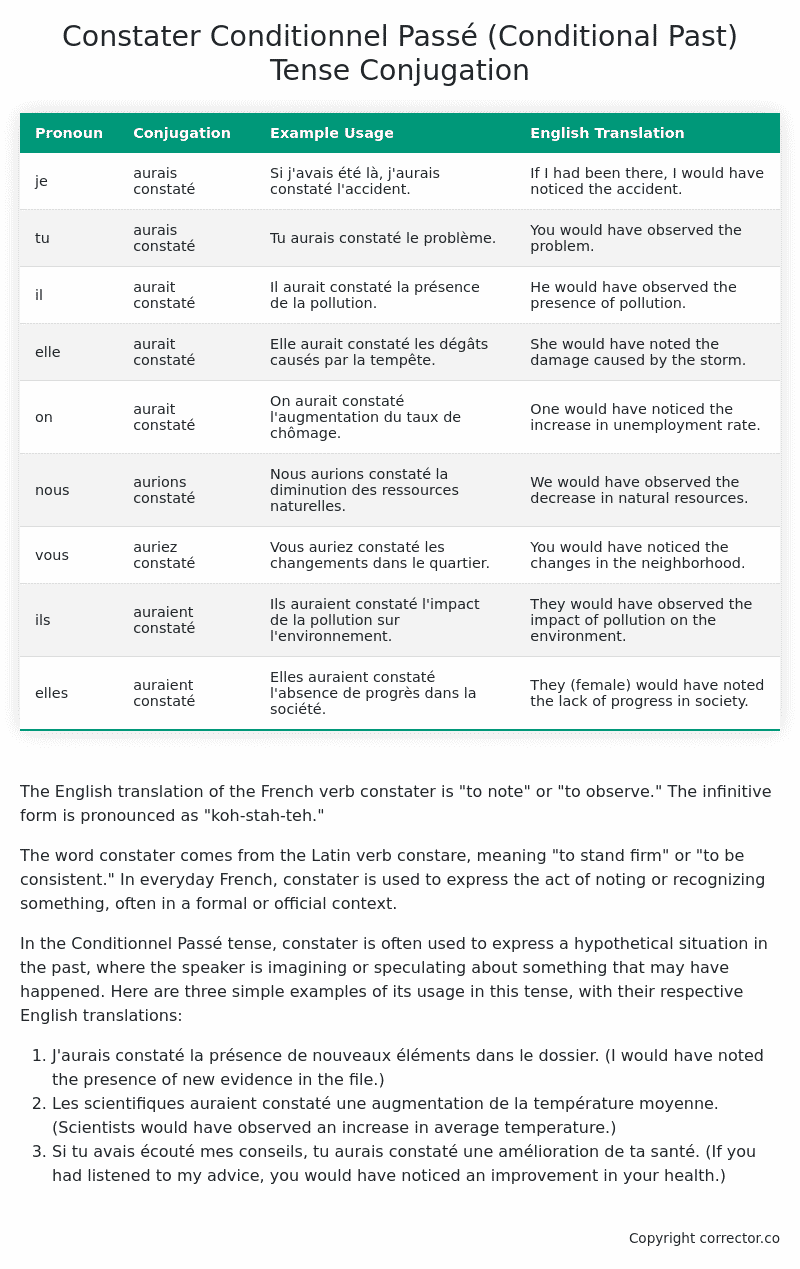Conditionnel Passé (Conditional Past) Tense Conjugation of the French Verb constater
Introduction to the verb constater
The English translation of the French verb constater is “to note” or “to observe.” The infinitive form is pronounced as “koh-stah-teh.”
The word constater comes from the Latin verb constare, meaning “to stand firm” or “to be consistent.” In everyday French, constater is used to express the act of noting or recognizing something, often in a formal or official context.
In the Conditionnel Passé tense, constater is often used to express a hypothetical situation in the past, where the speaker is imagining or speculating about something that may have happened. Here are three simple examples of its usage in this tense, with their respective English translations:
- J’aurais constaté la présence de nouveaux éléments dans le dossier. (I would have noted the presence of new evidence in the file.)
- Les scientifiques auraient constaté une augmentation de la température moyenne. (Scientists would have observed an increase in average temperature.)
- Si tu avais écouté mes conseils, tu aurais constaté une amélioration de ta santé. (If you had listened to my advice, you would have noticed an improvement in your health.)
Table of the Conditionnel Passé (Conditional Past) Tense Conjugation of constater
| Pronoun | Conjugation | Example Usage | English Translation |
|---|---|---|---|
| je | aurais constaté | Si j’avais été là, j’aurais constaté l’accident. | If I had been there, I would have noticed the accident. |
| tu | aurais constaté | Tu aurais constaté le problème. | You would have observed the problem. |
| il | aurait constaté | Il aurait constaté la présence de la pollution. | He would have observed the presence of pollution. |
| elle | aurait constaté | Elle aurait constaté les dégâts causés par la tempête. | She would have noted the damage caused by the storm. |
| on | aurait constaté | On aurait constaté l’augmentation du taux de chômage. | One would have noticed the increase in unemployment rate. |
| nous | aurions constaté | Nous aurions constaté la diminution des ressources naturelles. | We would have observed the decrease in natural resources. |
| vous | auriez constaté | Vous auriez constaté les changements dans le quartier. | You would have noticed the changes in the neighborhood. |
| ils | auraient constaté | Ils auraient constaté l’impact de la pollution sur l’environnement. | They would have observed the impact of pollution on the environment. |
| elles | auraient constaté | Elles auraient constaté l’absence de progrès dans la société. | They (female) would have noted the lack of progress in society. |
Other Conjugations for Constater.
Le Present (Present Tense) Conjugation of the French Verb constater
Imparfait (Imperfect) Tense Conjugation of the French Verb constater
Passé Simple (Simple Past) Tense Conjugation of the French Verb constater
Passé Composé (Present Perfect) Tense Conjugation of the French Verb constater
Futur Simple (Simple Future) Tense Conjugation of the French Verb constater
Futur Proche (Near Future) Tense Conjugation of the French Verb constater
Plus-que-parfait (Pluperfect) Tense Conjugation of the French Verb constater
Passé Antérieur (Past Anterior) Tense Conjugation of the French Verb constater
Futur Antérieur (Future Anterior) Tense Conjugation of the French Verb constater
Subjonctif Présent (Subjunctive Present) Tense Conjugation of the French Verb constater
Subjonctif Passé (Subjunctive Past) Tense Conjugation of the French Verb constater
Subjonctif Imparfait (Subjunctive Imperfect) Tense Conjugation of the French Verb constater
Subjonctif Plus-que-parfait (Subjunctive Pluperfect) Tense Conjugation of the French Verb constater
Conditionnel Présent (Conditional Present) Tense Conjugation of the French Verb constater
Conditionnel Passé (Conditional Past) Tense Conjugation of the French Verb constater (this article)
L’impératif Présent (Imperative Present) Tense Conjugation of the French Verb constater
L’infinitif Présent (Infinitive Present) Tense Conjugation of the French Verb constater
Struggling with French verbs or the language in general? Why not use our free French Grammar Checker – no registration required!
Get a FREE Download Study Sheet of this Conjugation 🔥
Simply right click the image below, click “save image” and get your free reference for the constater Conditionnel Passé tense conjugation!

Constater – About the French Conditionnel Passé (Conditional Past) Tense
Formation
Common Everyday Usage Patterns
Expressing Unreal Past Scenarios
Polite Requests or Suggestions
Expressing Doubt or Uncertainty
Interactions with Other Tenses
Conditional Present
Indicative Past Tenses
Conditional Future
Summary
Want More?
I hope you enjoyed this article on the verb constater. Still in a learning mood? Check out another TOTALLY random French verb conjugation!


